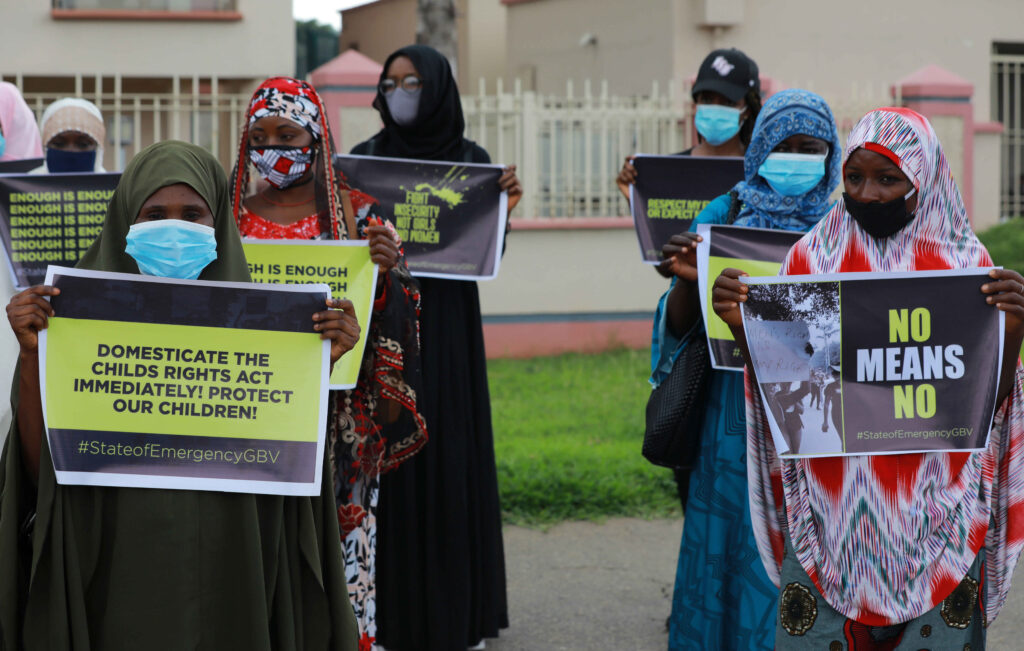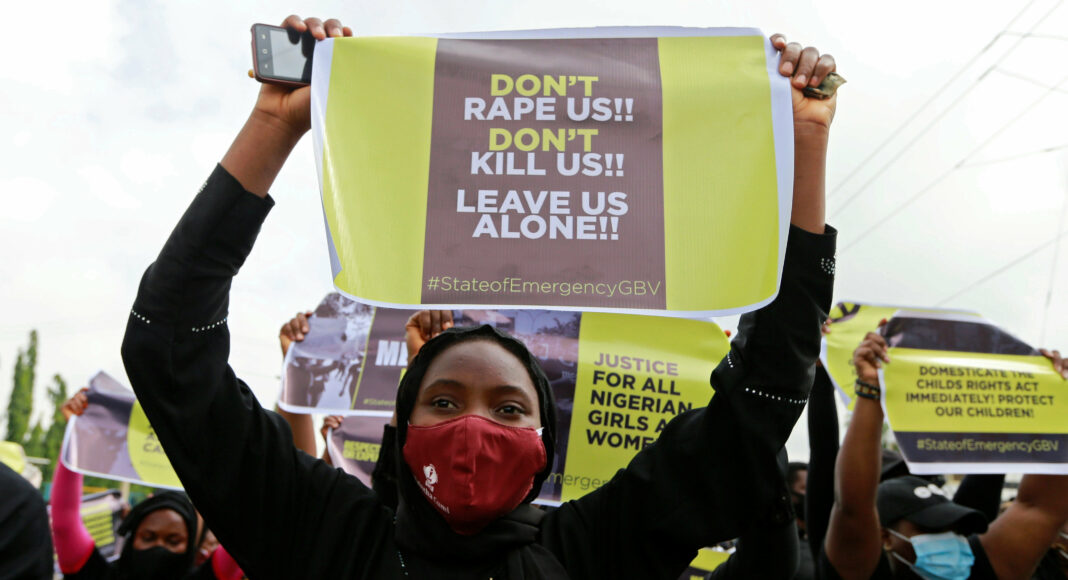By Shade Mary-Ann Olaoye
On May 30th, 2020, while dealing with the unforeseen consequences of the global pandemic, Nigerian women came together to mourn the death of Vera Uwalia Omozuwa, a Nigerian student who was physically and sexually assaulted three days earlier.
This was not the first national outcry to stop the rapes and murders of women and girls living in Nigeria, and it would not be the last. On April 29th, 2021, the hashtag #FindHinnyHumoren went viral because the job-seeking graduate from Uyo, Akwa Ibom, went for a job interview after putting out a call for employment on Twitter, went missing. She was found a few days later, raped and murdered.
The succession of gory tragedies once again led Nigerian women to mourn and start an online protest as they bonded over inhumane stories of harassment, rape, and how dangerously unsafe the country they live in has become for their gender.
According to UNICEF data, one in four Nigerian girls have been sexually assaulted before the age of 18. In June 2020, Nigeria declared a state of emergency on rape and sexual violence in all its 36 states. But despite this, rape culture, which consists of victim-shaming and a lackadaisical attitude towards justice and fair trials, is still prevalent.
Although the Nigerian criminal code recommends life imprisonment for the crime of rape, it leaves loopholes by limiting rape to penis-vagina penetration. The conviction rate of rapists within the country is low, but not because rape and sexual assault crimes are rare. According to the Nigerian police, between January and May 2020, there was a record of 717 reported rape cases. This is because women who accuse men of sexual assault in Nigeria have faced unimaginable backlash, high-profile defamation lawsuits, and retaliatory police investigations. All these combined form a ball of silence and fear.
Gender-based violence in Nigeria is often left underreported, with little to no tangible justice. “Most rape cases that happen in Nigeria are not reported because of reasons like the trust gap that exists with law enforcement agencies, cultural barriers, the fear of victimization, and stigmatization,” explained social worker and human rights advocate Oniyide Oluwaseun Olutoni recounted.
“I remember when I was working at an NGO that advocated for women’s rights, we handled a case of a 2 years old child that was raped by a 50 years old man. The mother of the child refused to press charges, she said that she didn’t want the child to grow up being discriminated against rather, she moved away from the neighborhood,” she said.
Stories of sexual assault are often made public years after the incident, when the victim is bold enough to tell her story. But those stories are often met with questions like, “Why now?” and “Why did it take her so long?” In a country like Nigeria, where justice is often negotiated and women have to live with the trauma of self-blame and victim-shaming, the consequences of coming forward are often extremely costly.
27-year-old Bliss* said that when she was attacked by her university classmate, she refused to report the incident, even to her friends. “I kept thinking of all the questions they would ask me. Like why did I go to his place? Why was I too friendly with him in class, and why did I wear what I wore,” she said.
Figures from the Mirabel Center show that out of the 2,250 recorded rape cases in Lagos, just 18 convictions were made. On social media, Nigerian women use hashtags like #JusticeforJenifer, #JusticeforUwa, and #JusticeforUwa to spotlight all forms of gender-based violence and broaden the understanding of what constitutes violence and harassment.
Abusers count on silence to justify the staggeringly low number of prosecutions made, which they then use as an excuse to reinforce a high level of stigmatization and victim-blaming. All these factors have propelled Nigerian women to initiate conversations that seek to dismantle rape culture, participate in online protests for their voices to be heard, and march in the streets to address the problem of sexual violence. This manifested in the #MeToo and #ArewaMeToo movement within Nigeria, in which a large number of women shared personal stories of harassment and abuse.

In response to women coming forward, it has become common for men to counteract their outpouring of fear, pain, and anger with the “not all men” instigation, a form of mansplaining that does nothing to create safe lives for women.
Treasure Ogbalu, a Youtuber and social media influencer opined that saying “not all men” is the same as defending men who are abusers because the number of men who molest and harass women is higher than those who don’t.
“It is ‘not all men’ until a man becomes a father and he warns his daughters about boys, tells her not to stay out late or take a man as a company when she is going out,” said Eve, a woman in her mid-thirties. Funny thing is, a lot of these men are scared of their kind and take extra caution, but when a woman tells her story of sexual violence, it becomes ‘not all men,’” she explained.
Nigerian women are susceptible to cases of sexual violence regardless of their social and economic class. Women are kidnapped and become bounties of national crises like the #BringBackOurGirls mass abduction in Chibok in 2014, the sexual abuse and exploitation of 43 women and girls living in seven internally displaced person camp (IDPs) in Maiduguri, Borno State, and the high number of insurgent attacks in northern Nigeria.
Hassana Maina, one of the conveners of the #ArewaMeToo movement, agrees that social media has been an effective tool for women to talk about their experiences. “In a society where women are considered to not have voices, daring to even point at someone, especially a man, and accuse him of rape, is very bold,” she affirmed.
But the act of seeking justice via social media is also a privilege, says Grace, a fitness coach. “What happens to women, mothers, girls, who have no access to the power of social media? What more can they do when the entire justice system of Nigeria is against them?” she asked.
The patriarchal legal system in Nigeria allows for the justification of gender-based subjugation. Marital rape, for example, is not considered rape within the country. Section 357 of the Nigerian Criminal Code defines rape as follows:
“Any person who has unlawful carnal knowledge of a woman or girl, without her consent, or with her consent, if the consent is obtained by force or by means of threats or intimidation of any kind, or by fear of harm, or by means of false and fraudulent representation as to the nature of the act, or, in the case of a married woman, by personating her husband, is guilty of an offense which is called rape.”
Rape in marriage is not considered rape according to Nigerian law. Section six of the Code provides that “unlawful carnal knowledge” means “carnal connection, which takes place otherwise than between husband and wife.”
Women go through extra measures to protect themselves and guarantee their safety because they are aware that if anything was to go wrong, they will be the first to blame. But to what extent can a woman be safe?
“I have my pepper spray with me whenever I’m going out and I also want to buy a taser,” said university student Zainab Sani.
Chinenye*, on the other hand, recounts moments where her former boss would make sexual advances towards her. “He would call me into his office and ask me to hug him, make inappropriate comments, try to kiss me, and call me into secluded spaces within the company.”
“As a girl, I have felt unsafe all the time. I know how vulnerable I am so if, by any chance, I am still out by 7 pm, I start having anxiety. I also feel unsafe in the market with male strangers groping at me. I have had an experience where a man was touching me inappropriately. Unfortunately, I don’t have the confidence to make a video and post on social media,” said Ifeoma*.
But living life with this level of precaution and alarm shouldn’t be normalized, as more women and girls continue to be at risk.
“When it comes to justice, a lot is being at play for instance we see the media trivializing the crime of rape. What can be done in Nigeria is what we have been saying for years. We need to have the Violence against person Prohibition act domesticated and implemented in all states,” said Hassana Maina.
“We need to see that every state has a sexual assault referral center and a sex offender’s registry where sex offenders can be registered, thereby shifting the shame from the victim to the perpetrator. I believe that when these and more are done, that the country is sending a clear message on its stance against gender-based violence,” she said.
*Names with asterisks have been changed to protect the identity of the person quoted.


